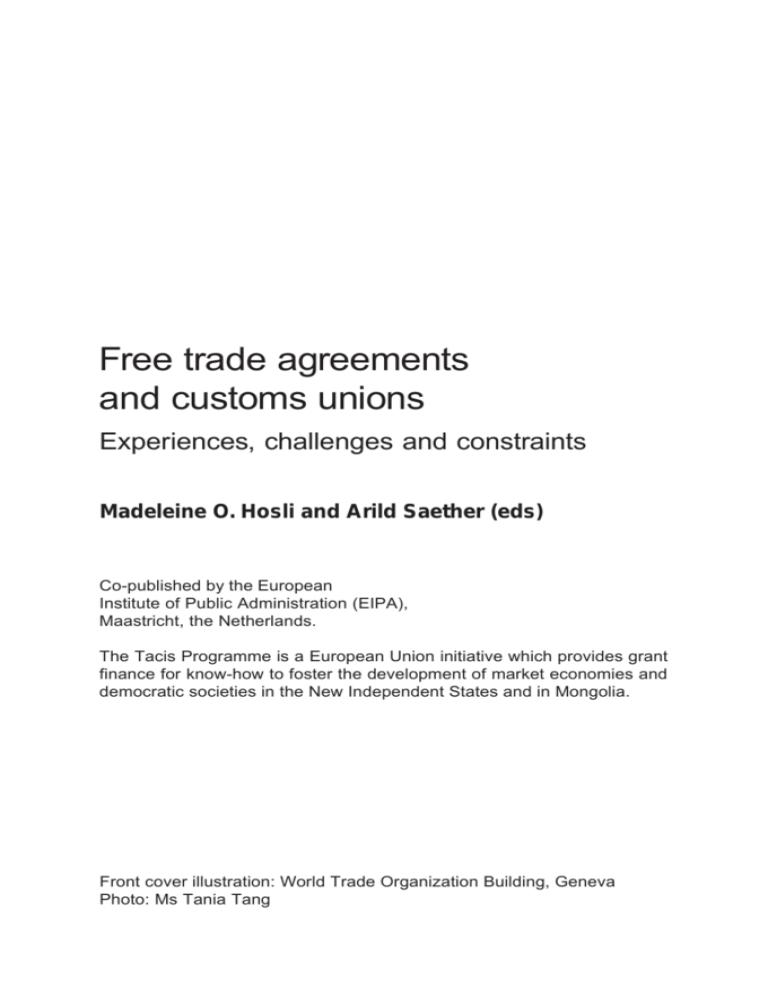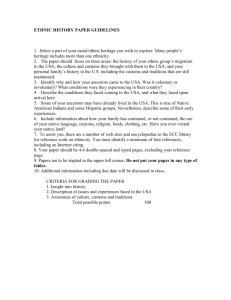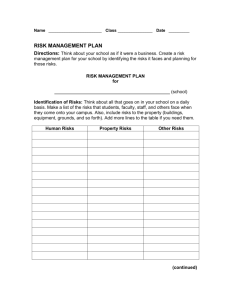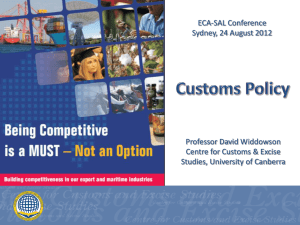
Free trade agreements
and customs unions
Experiences, challenges and constraints
Madeleine O. Hosli and Arild Saether (eds)
Co-published by the European
Institute of Public Administration (EIPA),
Maastricht, the Netherlands.
The Tacis Programme is a European Union initiative which provides grant
finance for know-how to foster the development of market economies and
democratic societies in the New Independent States and in Mongolia.
Front cover illustration: World Trade Organization Building, Geneva
Photo: Ms Tania Tang
Published May 1997
Copyright © 1997 by Tacis services DG IA, European Commission
All rights reserved.
This publication may only be reproduced, distributed or transmitted, in any
form, with the prior permission in writing of the European Commission,
Directorate General IA, Tacis.
Enquiries concerning reproduction should be sent to
the Tacis Information Unit,
European Commission,
Montoyerstraat 34 Rue Montoyer
B-1000 Brussels
This publication has been prepared by the European Institute of Public
Administration, Maastricht, the Netherlands.
The findings, conclusions and interpretations expressed in this publication
are those of the individual experts and do not reflect the policies or
opinions of the European Commission.
Printed by Atlanta, Belgium
ISBN 90-6779-108-3 (European Institute of Public Administration,
Maastricht, the Netherlands)
ii
Contents
What is Tacis?
vi
Abbreviations
vii
Contributors
x
Introduction
Free Trade Agreements and Customs Unions
Madeleine O. Hosli and Arild Saether
The Tacis Seminars Programme
Catherine de Montlibert
Chapter 1
11
Theory and Methods of International Trade
1. The Economic Theory of Customs Unions and Free
Trade Areas
Aad van Mourik
2. The Role of Competition Policy in Economic Integration
and the Role of Regional Blocs in Internationalizing
Competition Policy
Phedon Nicolaides
3. Capacities for Regional Integration: A Conceptual
Framework for Comparative Analysis
Edward Best
Chapter 2
3
19
35
51
From a Customs Union to the European Union
4. The Internal Market and Free Trade in the European Union
Andrea Rossi
5. The Experience of Forming a Customs Union in the
European Community
Richard Condon
iii
79
105
Chapter 3
Free Trade in Western Europe
6. The European Free Trade Association: A Failure or
a Success?
Arild Saether and Anders Skonhoft
7. Trade Flows in Western Europe: The Experience of
the European Community and of the European Free
Trade Association
Madeleine O. Hosli
8. Successfully Squaring the Circle: Liechtenstein’s
Membership of the Swiss and European Economic Area
Sieglinde Gstöhl
Chapter 4
121
145
163
Regional Cooperation and Free Trade
9. The Association of South-East Asian Nations (ASEAN):
Towards Closer Economic Cooperation
Rita Beuter
179
10. The North American Free Trade Agreement (NAFTA):
What it is and How it Came to Be
Jennifer B. Shulman
197
Chapter 5
Free Trade Extended Eastwards
11. Patterns and Trends in Trade between the European
Union, the Countries of Central and Eastern Europe
and the New Independent States
Maurice Guyader
12. The Contractual Frameworks for Trade Between the
European Community and the Independent States of the
Former Soviet Union, and the Prospects for the Future
Development of these Frameworks
David A. Tirr
13. The Multilateral Rules on Free Trade Agreements
and Customs Unions: Some Implications for the
Accession of the Commonwealth of Independent
States (CIS) to the World Trade Organization (WTO)
Jean-Pierre De Laet and Ian Fletcher
iv
229
241
253
14. European Integration and Trade Regimes: From the
European Economic Area to the ‘Europe’ Agreements
Finn Laursen
267
15. The Customs Union Agreement between Turkey and
the European Union
Sübidey Togan
293
Conclusions
Madeleine O. Hosli and Arild Saether
v
315
What is Tacis?
The Tacis Programme is a European Union initiative for the New Independent
States and Mongolia which fosters the development of harmonious and
prosperous economic and political links between the European Union and
these partner countries. Its aim is to support the partner countries’ initiatives
to develop societies based on political freedoms and economic prosperity.
Tacis does this by providing grant finance for know-how to support the
process of transformation to market economies and democratic societies.
In its first six years of operation, 1991-1996, Tacis has committed ECU 2,807
million to launch more than 2,500 projects.
Tacis works closely with the partner countries to determine how funds should
be spent. This ensures that Tacis funding is relevant to each country’s own
reform policies and priorities. As part of a broader international effort, Tacis
also works closely with other donors and international organisations.
Tacis provides know-how from a wide range of public and private organisations
which allows experience of market economies and democracies to be
combined with local knowledge and skills. This know-how is delivered by
providing policy advice, consultancy teams, studies and training, by developing
and reforming legal and regulatory frameworks, institutions and organisations,
and by setting up partnerships, networks, twinnings and pilot projects. Tacis
is also a catalyst, unlocking funds from major lenders by providing preinvestment and feasibility studies.
Tacis promotes understanding and appreciation of democracy and a marketoriented social and economic system by cultivating links and lasting
relationships between organisations in the partner countries and their
counterparts in the European Union.
The main priorities for Tacis funding are public administration reform,
restructuring of state enterprises and private sector development, transport
and telecommunications infrastructures, energy, nuclear safety and
environment, building an effective food production, processing and distribution
system, developing social services and education. Each country then
chooses the priority sectors depending on its needs.
vi
Abbreviations
ACP:
AEM:
AFTA:
AIC:
AIJV:
AIP:
AMM:
APEC:
ASEAN:
BRITE:
CACM:
CAP:
CCC:
CCC:
CCCN:
CCP:
CCT:
CE:
CEECs:
CEFTA:
CEN:
CENELEC:
CEPT:
CET:
CIS:
CITES:
CM:
CMEA:
COO:
CRTA:
CT:
CU:
CUFTA:
CVD:
EAGGF:
EBRD:
EC:
ECLAC:
African, Caribbean and Pacific States
Asean Economic Ministers
Asean Free Trade Area
Asean Industrial Complementation Scheme
Asean Industrial Joint Venture
Asean Industrial Projects
Asean Ministers Meeting
Asia-Pacific Economic Cooperation
Association of South-East Asian Nations
Basic Research in Industrial Technologies for Europe
Central American Common Market
Common Agricultural Policy
Community Customs Code
Customs Cooperation Council
Customs Cooperation Council Nomenclature
Common Commercial Policy
Common Customs Tariff
Certificat européen
Central and East European Countries
Central European Free Trade Area
Comité européen de normalisation (European Committee
for Standardization)
Comité européen de normalisation électrotechnique
(European Committee for Electrotechnical Standardization)
Common Effective Preferential Tariff
Common External Tariff
Commonwealth of Independent States
Convention on International Trade in Endangered Species of
Wild Flora and Fauna
Common Market
Council for Mutual Economic Assistance (also called
COMECON)
Certificate of Origin
WTO Committee on Regional Trade Agreements
Customs Treaty between Liechtenstein and Switzerland
Customs Union
Canada-US Free Trade Agreement
Countervailing Duties
European Agricultural Guidance and Guarantee Fund
European Bank for Reconstruction and Development
European Community
United Nations – Economic Commission for Latin America
vii
and the Caribbean
European Coal and Steel Community
European Currency Unit
Electronic Data Interchange on Commerce
European Economic Area
European Economic Community
European Economic Space
European Free Trade Association
European Investment Bank
European Institute of Public Administration
European Monetary System
Economic and Monetary Union
European Standard
Effective Protection Rate
European Regional Development Fund
European Strategic Programme in Research and
Development in Information Technology
EU:
European Union
EUREKA:
European Research Coordinating Agency
EUROSTAT: Statistical Office of the European Communities
FDI:
Foreign Direct Investment
FTA:
Free Trade Agreement
GATS:
General Agreement on Trade in Services
GATT:
General Agreement on Tariffs and Trade
GDP:
Gross Domestic Product
GNP:
Gross National Product
GSP:
General System of Preferences
IA:
Interim Agreement
IBRD:
International Bank for Reconstruction and Development
(World Bank)
IMF:
International Monetary Fund
LAFTA:
Latin America Free Trade Association
LQZ:
Liechstensteinische Gesellschaft für QualitätssicherungsZertifikate AG
MEK:
Economic Cooperation Committee of the CIS
MERCOSUR: Mercado Comun del Sur (Countries of the South American
Common Market)
MFN:
Most Favoured Nation
NACE:
Nomenclature générale des activités économiques dans les
Communautés européennes (General Industrial
Classification of Economic Activities within the European
Communities)
NAFTA:
North American Free Trade Agreement
NCPI:
New Commercial Policy Instruments
NIS:
New Independent States
ECSC:
ECU:
EDICOM:
EEA:
EEC:
EES:
EFTA:
EIB:
EIPA:
EMS:
EMU.
EN:
EPR:
ERDF:
ESPRIT:
viii
NPR:
NT:
NTB:
OECD:
OEEC:
OJ:
PCA:
PEMEX:
Phare:
PMC:
PTA:
PTT:
RACE:
ROO:
SAD:
SEA:
SELA:
SITC:
SME:
TAC:
Tacis:
UNCTAD:
VAT:
WCO:
WTO:
Nominal Protection Rate
National Treatment
Non-tariff barriers
Organization for Economic Cooperation and Development
Organization for European Economic Cooperation
Official Journal of the European Communities
Partnership and cooperation agreement
Petroleos Mexicanos
See note below
Post-Ministerial Conference
Preferential Trading Agreement
Post, telephone and telegraph
Research in Advanced Communications for Europe
Rules of Origin
Single Administrative Document
Single European Act
Latin American Economic System
Standard International Trade Classification
Small- and medium-sized enterprises
Treaty of Amity and Cooperation
See note below
United Nations Conference on Trade and Development
Value Added Tax
World Customs Organization
World Trade Organization
Note
Phare and Tacis are not acronyms, and nor are they written in capital letters.
They are the European Union’s programmes for Central and Eastern Europe,
and the NIS and Mongolia respectively.
ix
Contributors*
Edward Best
Associate Professor of Political Science and
Head of the European Governance and
Policy Processes Unit, EIPA
Rita Beuter
Lecturer in International Relations, EIPA
Richard Condon
Head of Unit 7, responsible for Customs
Policy, Directorate B - Customs, DG XXI Customs and Indirect Taxation, European
Commission
Jean-Pierre De Laet
DG I - External Relations: Commercial policy
and relations with North America, the Far
East, Australia and New Zealand, European
Commission
Catherine de Montlibert
DG IA, External relations: Europe and the
New Independent States, common foreign
and security policy and external missions,
European Commission
Ian Fletcher
DG I - External Relations: Commercial policy
and relations with North America, the Far
East, Australia and New Zealand, European
Commission
Sieglinde Gstöhl
PhD candidate at the Graduate Institute of
International Studies in Geneva, Switzerland,
and former project manager of the EEA
proponents’ association Vereinigung
EWRplus in Liechstenstein
Maurice Guyader
DG IA, External relations: Europe and the
New Independent States, common foreign
and security policy and external missions,
European Commission
____________________________________________________________
* The views expressed in the individual contributions to this book are the
authors’ own. These views are not necessarily those of the organization
with which the author is associated.
x
Madeleine O. Hosli
Visiting Assistant Professor, The Graduate
Institute of International Studies, Geneva
(formerly Senior Lecturer in Economics,
EIPA)
Finn Laursen
Professor of Political Science and Director of
Torkild Kristensen Research Institute,
Southern Jutland University Centre, Esbjerg,
Denmark
Aad van Mourik
Associate Professor of International
Economics, EIPA
Phedon Nicolaides
Professor of International Economics and
Head of EC Policies Unit, EIPA
Andrea Rossi
College of Europe, Bruges, Belgium
Arild Saether
Professor of Economics, EIPA
Jennifer B. Shulman
PhD student, University of Michigan
Anders Skonhoft
Associate Professor of Economics,
Norwegian University of Science and
Technology, Trondheim
David A. Tirr
DG 1A - External relations: Europe and the
New Independent States, common foreign
and security policy and external missions,
European Commission
Sübidey Togan
Professor of Economics, Chairman of
Department of Economics, Bilkent University,
Ankara, Turkey
xi







